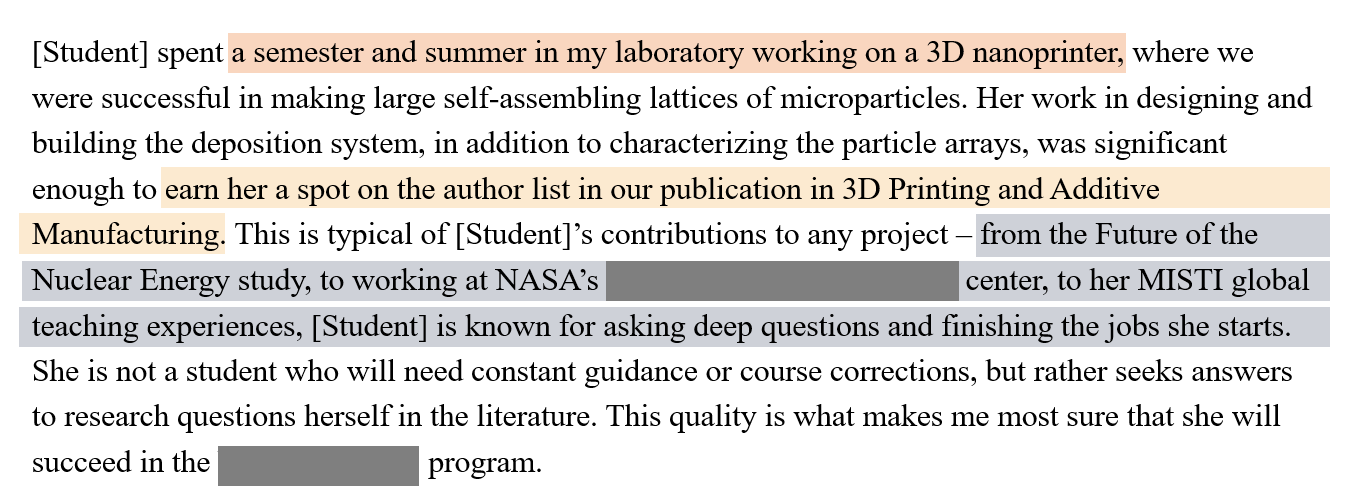“Tell us about a time when” is a common type of interview question. “Tell us about a time when you overcame an obstacle,” “a time when you failed,” “a time when you worked with a team to meet a deadline.” The point of these questions is to gather information that’s important to the role but cannot be found anywhere else in the candidate’s application. And that is the same reason why reviewers ask for letters of recommendation. They want to know the candidate beyond the transcript and resume. For you as a reference letter writer, this is your opportunity to share your perspective on the candidate.
For those who are new to writing letters of recommendation, framing your thinking as a response to a “Tell us about a time when” question will also help to:
- be truthful,
- be concrete,
- be yourself.
I’ve written a dozen letters of recommendation throughout my formal teaching career, and I’ve seen just as many written by faculty for NSE students and postdocs. If you can follow these three practices, you are likely on the right track.
Be truthful
That means being honest with reviewers and avoiding superlatives to describe someone you think might be weak for the position. Your word is part of your professional brand, and you don’t want to be known as someone whose assessment can’t be trusted. For instance, you shouldn’t rate all your students as being in the “top 5%.”
It also means being honest with your mentee if you’re not confident that you can write a strong letter. A few years back, one of my students asked to be recommended for a summer position at a chemistry lab. Though she was an excellent student in my lectures, I couldn’t speak to her abilities at the bench—and I told her so. She insisted on using me as a reference, so I focused on the qualities that I could stand by: that she showed a healthy dose of skepticism when learning about new concepts, that she stood out among her peers as someone who was able to manage self-paced assignments, and that she performed well on quizzes. I did not, however, make assumptions about her work in the lab.
Be concrete
You’ll need to identify which 2-3 skills or attributes the reviewer would be interested in, and reflect on times when you observed your mentee demonstrating those specific skills or attributes. Make sure you understand what the program or position entails so that you can make a stronger case for the person you are recommending.
To organize your reflections about your mentee into a letter, follow this standard formula or browse templates online (with some skepticism). Each paragraph that focuses on a specific skill should start with a strong opening sentence. Then, quantify experiences whenever possible and use concrete examples to support your claims as shown in the excerpts below. This will help you avoid the less-successful “all praise, no substance” approach.
Be yourself
Use active voice, and use your voice. If you’re excited about the applicant’s prospects, do not hesitate to show that. Here’s the opening paragraph of a successful letter of recommendation:
“It is with great pleasure that I write to enthusiastically, in the strongest of terms, recommend Dr. [Postdoc] for an assistant professor position at [School Name]. I could go on for perhaps a dozen pages about how [Postdoc] has built up both his and my career, though I will restrict myself to just three. And, if asked to describe [Postdoc] in a single word, it would be ‘ready.’ Ready to teach and mentor, ready to lead a new and dynamic research group.”
Final considerations
As you write, check for implicit racial bias and gender bias. As an advocate for the applicant, ensure that you are truly positioning them for success. (Being aware of these biases in letters of recommendation will also help you make a more informed decision if you ever find yourself in the shoes of a reviewer.)
Whether you’re writing a letter of recommendation for your UROP mentee or nominating someone for a special award, take the time to research the target program and to reflect deeply on your experiences with the candidate. A strong and thoughtful letter takes hours to write. It is also an opportunity for you to make an impact on someone’s professional journey. Thus, writing a strong letter of recommendation is not only a responsibility but also a privilege. Start early, do the best you can, and seek feedback to make sure the letter is as effective as it can be.
Marina Dang is the NSE Communication Lab manager. Her first-hand experience with letters of recommendation mainly comes from her teaching roles at Brandeis University and Emmanuel College, prior to coming to MIT.
Published October 21, 2020
Related articles:
- How to Ask for Letters of Recommendation
- CV/Resume
- Graduate School Personal Statement
- Fellowship Personal Statements
For customized feedback, schedule a time to speak with a Communication Fellow.


